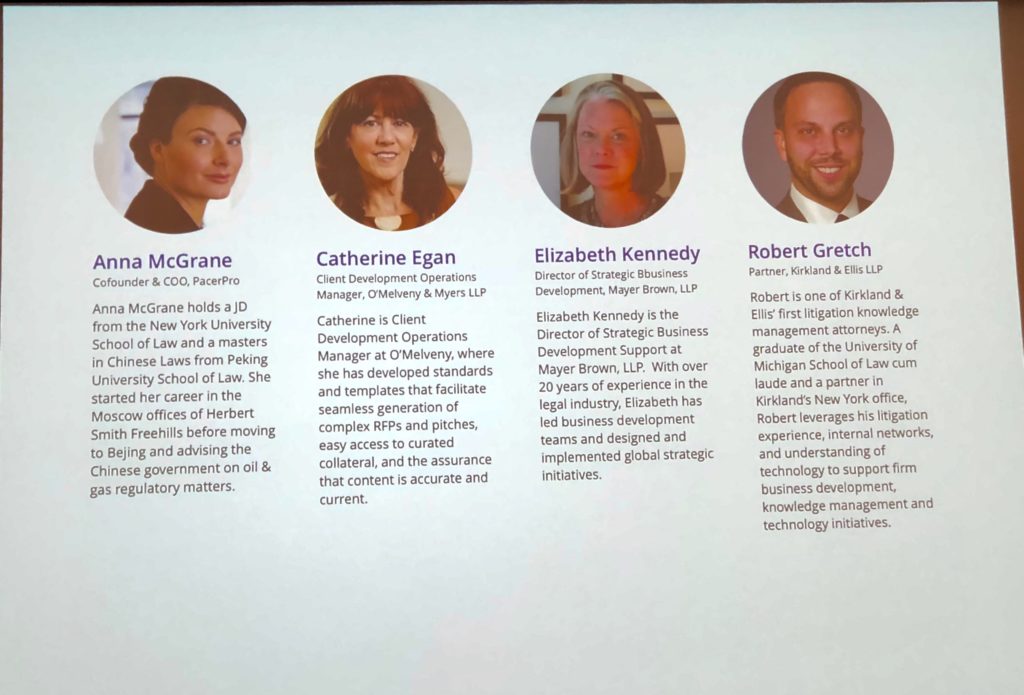This is a live post from the Ark Knowledge Management conference; the title of this talk is Building your Firm’s Book: Knowledge Management and RFPs. The presenters are
- Robert Gretch, Partner, Kirkland & Ellis LLP
- Catherine Egan, Client Development Operations Manager, O’Melveny & Myers LLP
- Elizabeth Kennedy, Director of Strategic Business Development, Mayer Brown
- Moderated by Anna McGrane, COO, PacerPro

As with all my live conference blogs, I post as a session ends. So please forgive any typos of misunderstandings of meanings.
Major Trends in RFPs – Catherine. Clients are very interested in AFAs and long-term relationships. Clients want lawyers who can solve a range of problem, who understand their business. We are more selective about the RFPs to which we respond. BD works closely with pricing director to prepare alternative fee arrangements (AFA). We also have to make sure we put forward a diverse team. Our RFPs not only need to show our specific expertise, but we need to provide some strategic advice for free in the proposal. And we get jurisdictional and judge specific. That’s what’s needed to make the sale.
Major Trends in RFPs – Robert. Clients want to see your expertise in the proposal. You have to provide strategic guidance. It requires input from lawyers expert in that type of matter. For diversity, we have a person who focused on that.
Major Trends in RFPs – Elizabeth. We see many requests for innovation, efficiency, and process improvements. Clients focused on it not just for as a law firm but also their own law departments. For innovation, our KM team has tested tools with both our lawyers and our clients – we put their great stories in our proposals. Some of our proposals talk to technology to help the client solve its problems.
Win Loss Rates in Proposals. All the panelists also provide win-loss rates in their proposals. This depends on a combination of internal and external data. Anna asks about mix of internal and external data. One panelists says it depends on practice. Some maintain their own meticulous records, but some do not. Aside from access to the data, the concept of win-loss in litigation can be challenging because what a win or loss is not always clear cut. KM attorneys can help define what a loss or win is and when it’s partial (either direction).
Time You Take to Write a Proposal. “Proposals take as much time as you have”. Many can be very time consuming and some RFPs can be comparable to dealing with a TRO (temporary restraining order).
When a Firm Loses a Pitch, Why? Very common explanations are fees too high or relationship with another firm. (Ron comment: same as it ever was.) We have lost when clients say team we put forward was not diverse enough. Clients / prospects don’t always provide a reason.
Group Activity not captured
Session Description
Building your Firm’s Book: Knowledge Management and RFPs: Empowering Your BD Team with Critical Data
RFPs are critical to capturing new business. They also require an in-depth and nuanced understanding of firm experience. What’s the most challenging element of crafting an RFP in today’s increasingly data driven environment, and what can KM initiatives do to help?
Archives
Blog Categories
- Alternative Legal Provider (44)
- Artificial Intelligence (AI) (57)
- Bar Regulation (13)
- Best Practices (39)
- Big Data and Data Science (14)
- Blockchain (10)
- Bloomberg Biz of Law Summit – Live (6)
- Business Intelligence (21)
- Contract Management (21)
- Cool Legal Conferences (13)
- COVID-19 (11)
- Design (5)
- Do Less Law (40)
- eDiscovery and Litigation Support (165)
- Experience Management (12)
- Extranets (11)
- General (194)
- Innovation and Change Management (188)
- Interesting Technology (105)
- Knowledge Management (229)
- Law Department Management (20)
- Law Departments / Client Service (120)
- Law Factory v. Bet the Farm (30)
- Law Firm Service Delivery (128)
- Law Firm Staffing (27)
- Law Libraries (6)
- Legal market survey featured (6)
- Legal Process Improvement (27)
- Legal Project Management (26)
- Legal Secretaries – Their Future (17)
- Legal Tech Start-Ups (18)
- Litigation Finance (5)
- Low Cost Law Firm Centers (22)
- Management and Technology (179)
- Notices re this Blog (10)
- Online Legal Services (64)
- Outsourcing (141)
- Personal Productivity (40)
- Roundup (58)
- Structure of Legal Business (2)
- Supplier News (13)
- Visual Intelligence (14)

